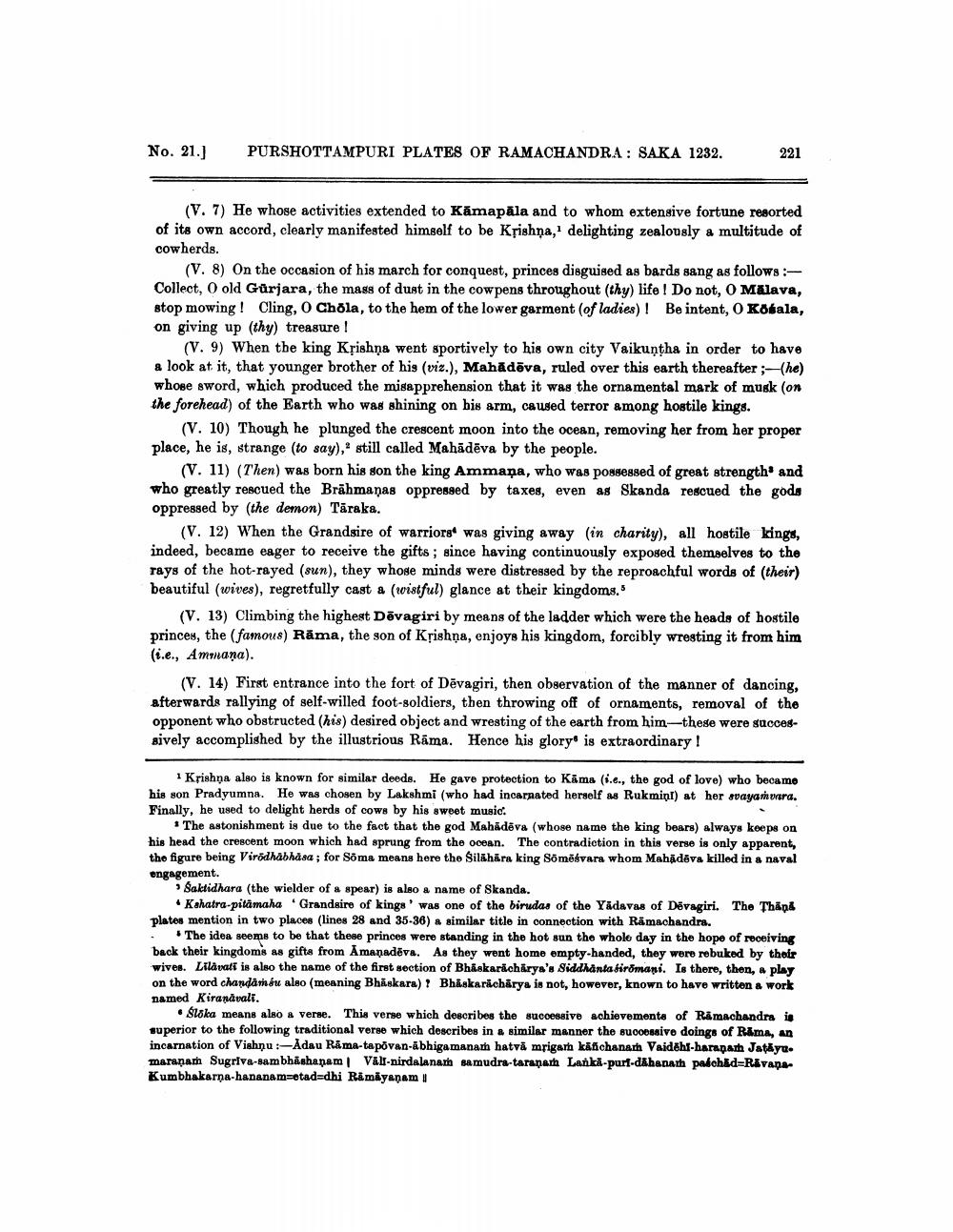________________
No. 21.]
PURSHOTTAMPURI PLATES OF RAMACHANDRA: SAKA 1232.
221
(V. 7) He whose activities extended to Kāmapala and to whom extensive fortune resorted of its own accord, clearly manifested himself to be Krishna, delighting zealously a multitude of cowherds.
(V. 8) On the occasion of his march for conquest, princes disguised as bards sang as follows: Collect, О old Gürjara, the mass of dust in the cowpens throughout (thy) life ! Do not, O Malava, stop mowing! Cling, O Chola, to the hem of the lower garment (of ladies)! Be intent, O Kobala, on giving up (thy) treasure !
(V. 9) When the king Krishṇa went sportively to his own city Vaikuntha in order to have a look at it, that younger brother of his (viz.), Mahādēva, ruled over this earth thereafter ;-(he) whose sword, which produced the misapprehension that it was the ornamental mark of musk (on the forehead) of the Earth who was shining on bis arm, caused terror among hostile kings.
(V. 10) Though he plunged the crescent moon into the ocean, removing her from her proper place, he is, strange (to say), still called Mahādēva by the people.
(V. 11) (Then) was born his son the king Ammaņa, who was possessed of great strength and who greatly rescued the Brāhmanas oppressed by taxes, even as Skanda rescued the gods oppressed by the demon) Tăraka.
(V. 12) When the Grandsire of warriors was giving away (in charity), all hostile kings, indeed, became eager to receive the gifts; since having continuously exposed themselves to the rays of the hot-rayed (sun), they whose minds were distressed by the reproachful words of (their) beautiful (wives), regretfully cast a (wistful) glance at their kingdoms.
(V. 13) Climbing the highest Dēvagiri by means of the ladder which were the heads of hostile princes, the famous) Rāma, the son of Krishna, enjoys his kingdom, forcibly wresting it from him (i.e., Aminana).
(V. 14) First entrance into the fort of Dēvagiri, then observation of the manner of dancing, afterwards rallying of self-willed foot-soldiers, then throwing off of ornaments, removal of the opponent who obstructed (his) desired object and wresting of the earth from him-these were successively accomplished by the illustrious Rāma. Hence his glory is extraordinary !
1 Krishna also is known for similar deeds. He gave protection to Kama (i.c., the god of love) who becamo his son Pradyumna. He was chosen by Lakshmi (who had incarnated herself as Rukmint) at her svayanura. Finally, he used to delight herds of cows by his sweet music.
* The astonishment is due to the fact that the god Mahadēva (whose name the king bears) always keeps on his head the crescent moon which had sprung from the ocean. The contradiction in this verse is only apparent, the figure being Virödhabhasa; for Soma means here the Silahāra king Somosvara whom Mahadáva killed in a naval engagement.
Saktidhara (the wielder of a spear) is also a name of Skanda.
• Kahatra-pitamaha Grandaire of kings' was one of the birudas of the Yadavas of Dévagiri. The Thank plates mention in two places (lines 28 and 35-36) a similar title in connection with Ramachandra. . The idea seems to be that these princes were standing in the hot sun the whole day in the hope of receiving back their kingdoms as gifts from Amanadēva. As they went home empty-handed, they were rebuked by their wives. Lilavati is also the name of the first section of Bhaskarichirya's Siddhanta siromani. Is there, then, play on the word chandambu also (meaning Bhaskara)! Bhaskaricharya is not, however, known to have written a work named Kiranavali.
Sloka means also a verse. This verse which describes the successive achievements of Ramachandra i superior to the following traditional verse which describes in a similar manner the successive doings of Rama, an incarnation of Vishnu :-Adau Rama-tapovan-abhiga manam hatva mrigarh kaichanamh Vaidehi-harapan Jatayu. maranam Sugriva-sambhashanam Val-nirdalanamh samudra-taranamh Lanka-part-dahanam padchid=Rāvana Kumbhakarna-hananam=etad=dhi Ramayanam ||




